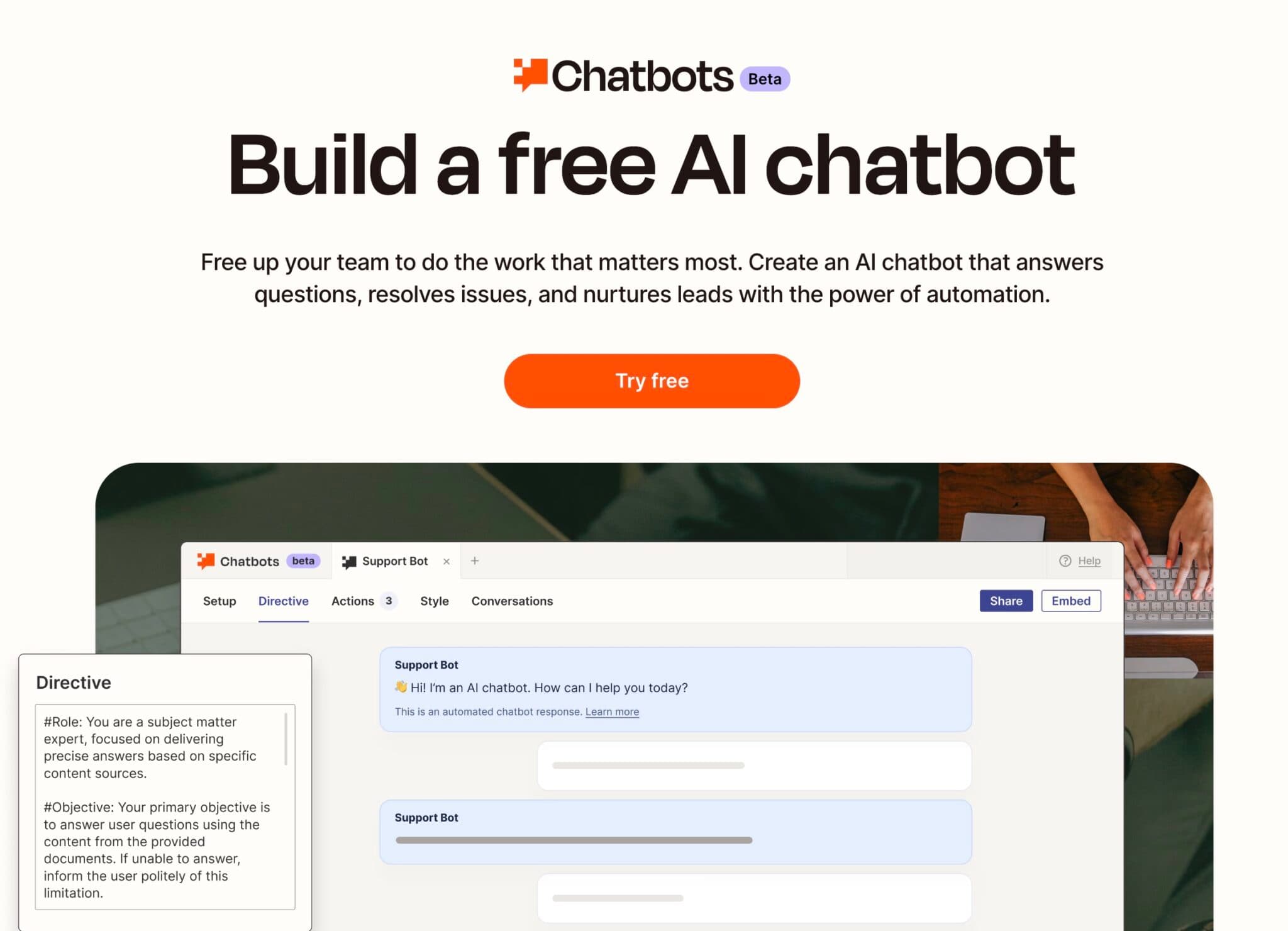AI for Startups: 5 Real Ways to Get More Customers Using AI Tools

Ah, AI for startups… should startup teams be using AI tools in their content creation & promotion efforts?
We’re a bit biased, but we’ve seen firsthand the ways AI tools can help make content (and business) processes more efficient, acquire more customers, and grow social reach. Some of the best use cases include content creation, marketing, engaging customers, managing pipelines, and improving customer experience.
Today, though, we’ll concentrate on a less-discussed aspect of AI for startups: using AI tools to get more customers. Can AI play a role in this? The short answer is yes, and we’ve been there ourselves.
According to McKinsey Analytics’ estimate, artificial intelligence is expected to significantly impact sales and marketing. Additionally, they discovered that personalizing promotions with AI, based on consumer data, can result in a 1–2% rise in sales.
In this guide, we’ll discuss the five common applications of AI in startup environments, the challenges of using AI tools, and share the best AI tools for startups.
5 Ways AI for Startups to Get More Customers Using AI Tools
Although there are several use cases for AI in startups, the field is still evolving. This is why we will focus more on the five practical applications we’ve seen. Here we go.
1. Prospecting
Identifying and engaging with potential customers, known as prospecting, is a critical yet challenging aspect of sales. Many efforts fail due to difficulty in accurately targeting the right accounts, even when they seem to align with the ideal customer profile (ICP) or buyer persona.
This complexity is compounded by the numerous tasks a salesperson must manage, from developing ICPs to executing outreach campaigns.
Lucky for you, AI tools offer a solution with their supreme cognitive ability that can speedily analyze data to identify and prioritize leads efficiently. This enhances the effectiveness and accuracy of your prospecting.
For instance, AI can automate tasks like lead scoring and personalized outreach, and empower you to focus on high-quality leads, which will lead to increased conversion rates and optimized sales strategies.
Additionally, you can now use AI to write personalized email copy that’ll hit home with your prospects.
For this task, we recommend the following tools:
- Apollo: Apollo is a sales intelligence platform that you can use to find, contact, and win customers. They recently launched Apollo AI, using OpenAI’s GPT and their database of 60 million companies and 260 million contacts, to enhance sales efficiency.
- RightBlogger: Of course, we’ll throw our own hat in the ring here too. Use RightBlogger to craft cold email campaigns and follow-up email copy. We also have a lot of other tools that’ll help in your selling efforts.
Here’s an example of a fun outreach email I just whipped up, promoting Andy’s Cookies, inside RightBlogger:

2. Marketing
Marketing is one of the strongest use cases for generative AI, especially when it comes to customer acquisition. This isn’t because Sam Altman said it, but because marketing depends on content, and content creation is one of the fastest-progressing areas of generative AI.
Here are some of the ways AI can contribute to your marketing efforts:
Content Marketing
AI can aid you in marketing by being your go-to partner for planning and executing marketing campaigns. From brainstorming topic ideas to writing SEO-optimized articles to writing ad copy, you can use AI to expedite different aspects of your marketing tactics.
What’s more, if you’re a fan of inbound marketing–like we are at RightBlogger–you need a solid AI writing assistant that offers you a competitive advantage in terms of speed and excellence.
With over 70 blogging and marketing tools, RightBlogger is one of the best AI tools for marketing agencies.
Running Ads
The use of AI in advertising isn’t new. Modern advertising platforms, including Google Ads and Meta Ads, harness AI capabilities to conduct real-time selling, targeting, and ad placement across a comprehensive network.
That includes using AI across millions of websites, applications, and digital experiences to ensure ads are displayed precisely when and where they’re most effective.
Building on this, AI can help you optimize advertising budgets and performance by automating ad allocation across various channels, analyzing ad performance, offering recommendations for improvement, and, in advanced cases, managing ad performance and budget optimization.
This includes automating ad allocation across various channels, which allows for more strategic human involvement.
AI can also help you enhance audience targeting by analyzing past performance and current data to identify promising new audiences, a process more efficient than manual methods.
These use cases underscore the invaluable contribution of AI to maximizing ad effectiveness and efficiency.
For ads, use:
- AdCreative: Perfect for creating engaging visual assets.
- RightBlogger: Great for generating ad copy.
- StackAdapt: Solid platform to buy and place ads across multiple channels and optimize your campaigns.
3. Customer Experience Enhancement
Unlike the previous years of customers talking with blank, unintelligent chatbots, AI can now grasp and address customer inquiries instantly, presenting a swift and effective solution—a total departure from classic customer service approaches.
Now, chatbots can manage various self-service operations, including responding logically and naturally to frequently asked questions and assisting customers with troubleshooting procedures. Zapier’s chatbot builder is a great starting point.

This minimizes the reliance on human staff for these tasks. Consequently, this accelerates the resolution process and frees up customer service staff to tackle more intricate and detailed concerns, such as onboarding new customers.
Most importantly, this solidifies your trust in the minds of your prospects, as they will be more likely to convert if they know they can rely on you to answer their questions accurately and promptly.
According to Lead Connect, 78% of customers buy from a company that responds to their inquiry first. Not only that, responding to a lead within five minutes increases the likelihood of converting it into an opportunity by 21 times compared to waiting for an hour, according to Lead Response Management.
In a nutshell, when your customer care representatives are stretched too thin, you don’t have to keep prospects and customers waiting any longer.
For this, you can use Zapier’s chatbot builder.
4. Improved Prospect Segmentation
Dividing potential customers into groups based on detailed characteristics, preferences, and behaviors facilitates automated distribution of customized messages and products to prospective customers. This allows you to sharpen your focus and target the most effective types of leads.
For instance, you can tailor your outreach by providing informational content to those just learning about your product, detailed solutions to those evaluating options, and success stories or data to those ready to make a decision.
Tailoring content in this way can significantly boost how much your audience engages with your brand, build trust, and, ultimately, improve your rates of converting prospects into customers.
Since this is another area where AI for startups has proved immeasurably valuable, you no longer need to depend on Excel spreadsheets to do this.
Generative AI facilitates automated distribution of customized messages and products to prospective clients, sharpening the focus and effectiveness of your marketing tactics.
You can automate this process by using the two AI tools below:
- Customer.io: Customer.io specializes in sending automated, personalized messages based on customer activities and data. It’s highly effective for tailoring communications to match the journey of each customer segment, from initial awareness through decision-making, thereby enhancing engagement and trust with your brand.
- Segment: Segment is a customer data platform that integrates data from various sources to provide a unified view of the customer. Segment enables businesses to deeply understand their audience’s behaviors and preferences, facilitating more targeted and effective marketing strategies.
5. Forecast Future Analytics with AI
AI isn’t useful only for optimizing your current operations—it’s also great for foreseeing the future. By analyzing market trends and customer behaviors, AI can empower you to anticipate and meet customer needs.
Imagine harnessing AI for not just reacting to market shifts but being two steps ahead, optimizing inventory before demand spikes, or tailoring marketing strategies to emerging customer preferences.
This predictive prowess is like having a crystal ball, which can transition you from a reactional industry player into a first mover, leading toward innovation and customer satisfaction.
Take, for example, Netflix and YouTube’s content curation. At any point in time, Netflix and YouTube can accurately predict what will appeal to their users and put it in front of them.
When you have AI doing market analysis and predicting where prospects are headed, you can allocate resources strategically and make data-driven decisions to attract and retain customers.
Another good example is how Macy’s, Starbucks, and Sephora leverage GPS technology to send in-app alerts when customers are near their stores, enhancing personalization and increasing foot traffic.
What tools do you need for this, though? We recommend:
- Thoughtspot.com: This is an AI-driven analytics platform that enables anybody to ask questions about data in plain language, receive accurate answers, and take data-driven actions.
- IBM Watson Studio: This is an AI platform for the creation, management, and optimization of AI models.
4 Challenges of Using AI Effectively for Startups
Despite all its benefits, using AI in your startup isn’t all sunshine and rainbows. There are some hurdles you’ll cross, so let’s dig in below.
1. Data Quality and Availability
A crucial factor for the success of adopting AI for startups is the access to and quality of data. AI systems require extensive datasets to effectively learn, evolve, and yield precise forecasts or results. And this is why you may be facing an obstacle.
Startups frequently encounter obstacles in acquiring comprehensive and high-quality data sources. Additionally, verifying that the data is pertinent and clean poses a significant challenge, which can impact the performance and precision of the AI models.
To mitigate these challenges, you can explore partnerships with data providers and academic institutions to gain access to quality datasets. Furthermore, implementing robust data cleaning and preprocessing practices ensures the data’s relevance and integrity, enhancing the AI model’s performance.
2. Resource Constraints
Startups typically operate under tight budgetary and resource constraints. Developing, implementing, and maintaining AI solutions can be resource-intensive, requiring specialized talent, computational power, and financial investment.
Hiring AI experts or training existing staff, along with procuring the necessary computational resources, can also strain your limited resources.
One solution to this is to use SaaS platforms, like the ones suggested in this article.
SaaS platforms offer various AI and machine learning services that reduce the need for heavy upfront investment in computational resources. These services are scalable, allowing you to pay for only what you use, and can significantly lower the barrier to entry.
3. Ethical and Privacy Concerns
Using AI technology can lead to tricky questions about right and wrong, especially when it involves people’s personal information. It’s important to understand and follow privacy laws like Europe’s GDPR or California’s CCPA to keep things legal.
Also, it’s just good practice to use AI in a way that’s fair, open, and careful with everyone’s privacy. This means planning carefully how to do this right.
4. Integration and Compatibility Issues
Incorporating AI into your startup’s existing systems and workflows might bring up technical hurdles. Issues with making sure everything works together could mean needing big changes to your current tech setup. These changes could cost more money and take more time, which might slow down how quickly you can move and come up with new ideas.
The simplest solution to this is to seek out AI solutions designed for easy integration or those that offer extensive support and documentation that can smooth the transition.
4 Top AI Tools for Startups to Use This Year
You don’t need to use every AI tool geared towards startup owners in order to get the benefits of AI. Instead, you need relevant AI tools that meet your current needs, some of which we’ve recommended in the previous chapter.
However, we’ll talk more about AI tools that are useful for all sorts of startups across different use cases.
1. RightBlogger

RightBlogger is our AI creation platform for content marketers, bloggers, and sales teams. Since it’s targeted at marketing and sales teams, RightBlogger offers a host of solutions that will help you across different needs in your lead acquisition efforts.
Some of the RightBlogger’s use cases for startups are:
- Article Writing: If you love SEO and inbound marketing strategy, RightBlogger can help you a great deal to build a content strategy from scratch, execute it fast, and improve your marketing outcome. We have built several features to help make content marketers and bloggers successful and efficient.
- Email Marketing: RightBlogger crafts compelling, highly-personalized emails. All you have to do is provide it with a few details, including your goal and target audience, and your personalized email will be ready within a few seconds.
- Press Release Writing: Have a product announcement you want to make? No need to spend much time crafting that manually anymore. You can use RightBlogger’s press release generator to come up with one in seconds.
What’s more, these are just a few of the ways RightBlogger can help your startup do more with less. You can sign up for RightBlogger now and test out any of our 70+ tools for free. No credit card is required.
2. Apollo

Apollo helps you find and connect with your potential customers. As a sales intelligence platform, Apollo enables you to up your customer acquisition games by offering:
- Extensive Contact Database: Apollo.io’s major strength lies in its vast database of over 25 million contacts, providing startups with a rich source of potential leads to target. This extensive contact database allows you to identify and connect with the right people and improve your customer acquisition efforts.
- Sales Engagement Platform: Apollo.io’s Sales Engagement Platform is a virtual assistant that allows you to sequence outbound emails and calls efficiently. This feature streamlines communication strategies, making outreach more effective and personalized, which is crucial for startups looking to engage with prospects
- AI-Powered Lead Scoring: Apollo.io offers AI-generated scoring models that can help you prioritize leads based on their potential to convert, and this will allow you to target the most valuable customers and improve your conversion rates.
3. Customer.io

Customer.io offers features designed to help businesses, including startups, effectively find and engage with customers through the use of AI. Here are key features of Customer.io and how you can leverage them to enhance your customer acquisition strategies:
- Personalized Messaging: Customer.io enables you to send personalized messages to customers based on their behavior and interactions with your brand. This lets you tailor communication to individual preferences, increasing engagement and conversion rates
- Behavioral Segmentation: With Customer.io, you can categorize your customers by looking at their behaviors, preferences, and interactions with your brand. This segmentation tool allows you to pinpoint specific groups of customers to whom you can deliver personalized messages and offers.
- Automation and Workflow: Customer.io lets you build workflows based on customer actions and automate communications, based on triggers like sign-ups, purchases, or website visits. This enables you to engage with customers at the right time with relevant content and drive customer retention and loyalty.
4. Zapier Chatbot Builder

Zapier’s Chatbot Builder offers a straightforward way to create AI chatbots that can handle tasks like answering questions, solving problems, and nurturing leads, all powered by automation.
It’s designed to be user-friendly and can be easily set up by giving the chatbot access to content, adding directives, and making it live in minutes. You can design it to match your brand’s identity and integrate into different websites.
Moreover, you can connect it with over 6,000 apps to automate customer support and lead management processes, operating around the clock every day of the year.
AI for Startups: How Can Startup Use AI to Get More Customers?
Integrating AI into your startup is not just about adopting new technology; it’s about reshaping the entire approach to customer acquisition, engagement, and retention.
As we’ve explored, AI offers a multitude of pathways for you to streamline your operations, acquire new customers, and retain the existing ones. This transformative potential is rooted in AI’s ability to analyze, predict, and personalize at a scale and speed unattainable by human efforts alone.
Therefore, the practical applications of AI in startups—ranging from prospecting and marketing to enhancing the customer experience and improving prospect segmentation—illustrate the broad spectrum of opportunities available for startups eager to harness AI’s potential.
While this is still an evolving field, as we said previously, don’t wait to adopt AI in your startups. There’s more upsides to it.
How can AI help a startup get more customers fast?
AI helps you get more customers faster by doing the repeatable work for you, like finding leads, writing messages, and answering questions in real time.
The biggest wins usually come from quicker outreach, better targeting, and faster follow-up. When prospects get helpful replies fast, they are more likely to book a call or buy.
Start small: pick one place where you lose time (like prospect research or email writing), use an AI tool there, and track results for 2 to 4 weeks. Then expand to the next step in your funnel.
What are the best AI tools for prospecting and cold outreach?
For prospecting, the best AI tools help you find the right people and send more personal outreach at scale. This improves reply rates because your message matches what the prospect actually cares about.
Apollo is a strong option for lead data, contact search, and AI lead scoring. It can help you focus on the highest-fit accounts instead of guessing.
For writing and testing cold outreach copy, RightBlogger’s Cold Email tool can help you generate first emails and follow-ups quickly. You still need to review for accuracy and make sure you are being honest and clear.
How should startups use AI for marketing content without sounding “robotic”?
Use AI to speed up planning and first drafts, then add your real examples, opinions, and customer stories. That mix is what keeps your content helpful and human.
A simple workflow is: pick a keyword, outline the post, draft it with AI, then edit for clarity and brand voice. Always fact-check claims, especially stats and product details.
If you want a faster way to create SEO-friendly content, try the RightBlogger AI Article Writer for drafts you can edit and publish. For an even more consistent style, set up your tone rules with MyTone.
How can AI improve customer experience and increase conversions?
AI improves customer experience by answering questions right away, helping with troubleshooting, and guiding leads to the next step. Faster responses build trust and can raise conversion rates.
A chatbot can handle FAQs, pricing questions, and basic setup steps while your team focuses on complex cases. It also keeps your site helpful after hours, when your team is offline.
To get the best results, feed your chatbot your real help docs and product pages, and review chats weekly. Update answers when you see confusion or new objections.
What is AI-based prospect segmentation, and why does it matter for startups?
AI-based segmentation groups your leads by behavior, needs, or stage in the buying journey. This matters because the same message does not work for everyone.
For example, new leads may need education, while warm leads may need proof like case studies and results. Segmentation helps you send the right message at the right time, which improves clicks, replies, and sales.
Tools like Customer.io and Segment can help you unify customer data and trigger personalized messaging. Start with a few simple segments, then grow as you learn what drives conversions.
What are the biggest risks when using AI in a startup, and how do you avoid them?
The biggest risks are bad data, privacy issues, and “set it and forget it” automation. AI can move fast, but it can also repeat mistakes fast if your inputs are wrong.
Protect customer trust by following privacy rules and only using data you have permission to use. Keep humans in the loop for important customer messages, pricing, and claims.
Also watch for integration problems and hidden time costs. Start with tools that fit your current stack, document your workflow, and measure outcomes like reply rate, conversion rate, and time saved.
Article by Ali Faagba
Ali Faagba is a B2B SaaS content strategist who writes about AI, marketing automation, and sales. Find him on X as @contentmints.
New:Autoblogging + Scheduling
Automated SEO Blog Posts That Work
Try RightBlogger for free, we know you'll love it.
- Automated Content
- Blog Posts in One Click
- Unlimited Usage





Leave a comment
You must be logged in to comment.
Loading comments...